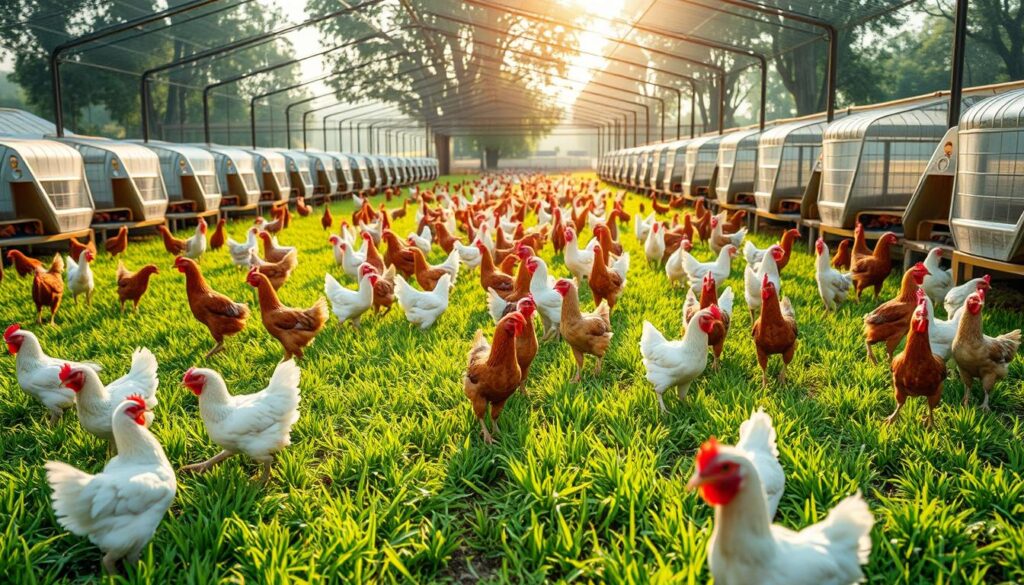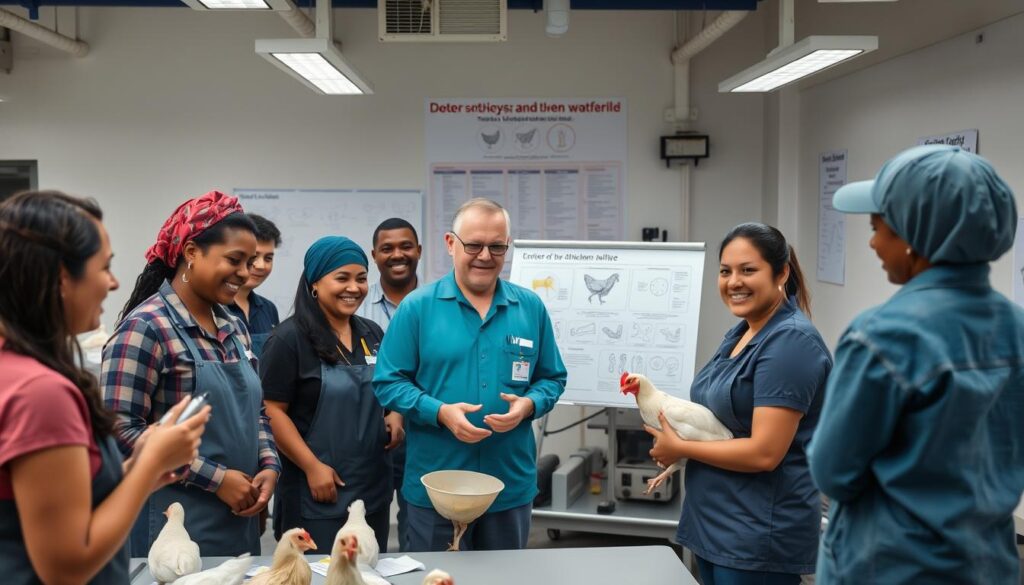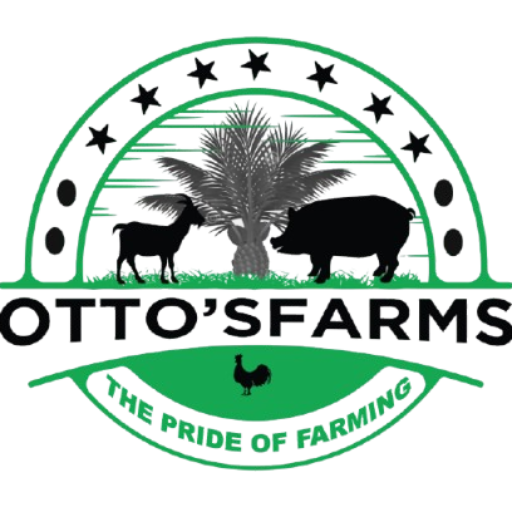The welfare of broiler chickens is a big concern in the poultry industry. Training and education play a key role in improving their well-being. This article explores the importance of understanding animal welfare standards and how proper handling affects chicken health.
It also looks at the need for a complete approach to managing poultry. By linking theory and practice, and encouraging ongoing learning, the industry can make a big difference. This will help both the chickens and the whole poultry system.
Key Takeaways
- The crucial role of training and education in enhancing broiler chicken welfare
- Understanding the significance of animal welfare standards and their impact on chicken health
- The importance of a comprehensive approach to poultry management
- Bridging the gap between theory and practice for improved welfare
- Fostering a culture of continuous learning and skill development among poultry workers
The Importance of Training in Broiler Chicken Welfare
Ensuring the welfare of broiler chickens is key to responsible poultry management. At the heart of this is the need for thorough training. This training helps farmers and handlers meet the highest animal welfare standards.
Understanding Animal Welfare Standards
Following animal welfare standards is vital for broiler chicken well-being. Farmers and handlers need to know the rules for treating these animals ethically. Training helps them understand and meet the birds’ needs, ensuring their comfort and health.
The Impact of Proper Handling on Chicken Health
Good handling practices greatly affect broiler chicken health. Trained staff can reduce stress and injuries, creating a calm environment. By learning humane handling techniques, farmers improve their birds’ health and productivity.
Effective poultry management focuses on animal welfare. Through ongoing education and training, farmers keep up with industry standards. This ensures their operations meet the latest best practices.
“Investing in the training and development of our poultry workers is not just a moral obligation, but a strategic imperative for the long-term success of our industry.”
Poultry Management: A Comprehensive Approach
Effective poultry management is key to ethical and sustainable broiler chicken care. It covers many areas, like housing, feeding, disease control, and animal welfare. At the core is the role of agricultural training, which teaches farmers and workers to manage with care and skill.
Poultry management needs a mix of science and practical experience. Through training, people learn about chicken behavior, nutrition, and the best living conditions. This knowledge helps them make choices that keep the flock healthy and productive.
These training programs also teach the value of ethical poultry production. They make the workforce understand the importance of treating animals with kindness. This leads to better handling, less stress, and better health for the birds.
| Key Aspects of Poultry Management | Importance |
|---|---|
| Housing and Environment | Providing clean, comfortable, and stress-free living conditions for broiler chickens |
| Nutrition and Feeding | Developing tailored feeding programs to meet the birds’ nutritional needs |
| Health and Disease Management | Implementing proactive measures to prevent and manage diseases, ensuring optimal bird health |
| Animal Welfare | Prioritizing the well-being of broiler chickens through humane handling and care |
By focusing on these key areas, farmers and workers can improve poultry management. This approach boosts productivity and supports ethical and sustainable practices. Strong agricultural training programs are crucial for the future of the broiler chicken industry.
The Role of Training and Education in Broiler Chicken Welfare
Training and education are key to better broiler chicken welfare. They help workers and farmers apply animal welfare principles in real life. This way, we can improve how we treat these animals.
Bridging the Gap Between Theory and Practice
Industry standards and rules are important, but they’re not enough. Workers need the skills to follow these rules and treat chickens well. Training that mixes classroom learning with practical experience helps a lot. It teaches workers to care for chickens in a humane way.
Continuous Learning for Improved Welfare
The poultry world is always changing, with new tech and research coming up. To keep up, workers need to keep learning. Worker training initiatives that promote ongoing learning are vital. They help workers stay updated on the latest in broiler chicken welfare.
By focusing on training and education, we empower workers to make better choices. They can take steps to improve the lives of broiler chickens. This approach, combining theory and practice, is crucial for lasting improvements in broiler chicken welfare.
“Education is the most powerful weapon which you can use to change the world.” – Nelson Mandela
Broiler Chicken Husbandry: Best Practices
Keeping broiler chickens healthy is key in ethical poultry farming. The American Humane Certified™ Animal Welfare Standards offer a detailed guide for top-notch care. They stress the need for humane treatment, which greatly affects the birds’ health and happiness.
Humane Handling Techniques
It’s vital to handle broiler chickens right to keep them comfortable and reduce stress. The standards list several best practices, including:
- Gentle and calm handling to minimize fear and distress
- Proper training for all personnel involved in handling the birds
- Careful monitoring of stocking density and environmental conditions to ensure the birds’ well-being
- Prompt veterinary care and attention for any injured or sick birds
Following these humane handling methods helps poultry producers raise broiler chickens ethically. It ensures the highest animal welfare standards.
| Husbandry Practices | Positive Impact on Broiler Chicken Welfare |
|---|---|
| Gentle handling | Reduced stress and fear levels, improved overall health |
| Proper staff training | Consistent and compassionate care for the birds |
| Careful monitoring of environmental conditions | Optimal living conditions that support the chickens’ natural behaviors |
| Prompt veterinary attention | Timely treatment of injuries or illnesses, minimizing suffering |

“Responsible broiler chicken husbandry is not only an ethical imperative, but it also has a direct impact on the overall health and well-being of the birds. By prioritizing humane handling practices, we can ensure the highest standards of animal welfare while promoting the sustainable and ethical production of poultry.”
Agricultural Training Programs: A Gateway to Better Welfare
Agricultural training programs are key to better broiler chicken welfare. They teach farmers, workers, and industry pros how to care for birds. This knowledge helps manage operations with the birds’ well-being in mind.
Poultry management is complex. These programs cover topics like animal welfare and humane handling. They help bridge the gap between knowing and doing, making a real difference for chickens.
Continuous Learning for Improved Welfare
The success of these programs comes from their focus on learning. The poultry industry changes fast. These programs offer ongoing education, keeping professionals updated on welfare.
They mix classroom learning, hands-on training, and mentorship. This way, participants understand the health and well-being of chickens. They can make better choices and drive change in their work.
| Program | Focus Areas | Certifications |
|---|---|---|
| Poultry Science Academy |
|
|
| National Poultry Improvement Plan |
|
|
By investing in these programs, the poultry industry is making a big step. It’s working towards a more ethical and sustainable future for broiler chickens.
“Investing in the education and training of our workforce is essential for driving positive change in the poultry industry and ensuring the highest standards of broiler chicken welfare.”
Worker Training Initiatives: Empowering the Workforce
Effective worker training is key to better broiler chicken welfare. It teaches poultry workers the skills needed for humane handling. This leads to better care for the birds.
On-Site Training and Mentorship
On-site training and mentorship are vital. They let workers learn and apply broiler chicken welfare practices in real settings. Workers get insights into humane handling practices through mentorship.
Training covers feeding, environment, and health checks. It builds a culture of learning and care. Workers learn to handle chickens with compassion.
- Emphasis on practical, on-site training
- Mentorship programs to guide workers
- Instruction on humane handling practices
- Focus on improving broiler chicken welfare
These worker training initiatives benefit more than just the chickens. They make workers feel valued and responsible. This leads to happier workers and better job retention.
“Investing in worker training is not only the right thing to do for the animals, but it also pays dividends for the long-term sustainability of the poultry industry.”
As the industry grows, on-site training and mentorship will keep being crucial. They ensure the workforce meets high broiler chicken welfare and humane handling practices standards.

Ethical Poultry Production: A Collaborative Effort
Making poultry production ethical is a big challenge. It needs everyone’s help, from farmers to consumers. We all must focus on keeping broiler chickens safe and happy.
The study on broiler chicken welfare shows we need a team effort. By talking openly and sharing knowledge, we can make real changes. This helps everyone work better together.
Engaging Stakeholders for Positive Change
Working together is key to a better future in poultry production. We can find new ways to care for chickens and make the industry better. This way, we all move forward together.
- Engaging farmers to understand their challenges and provide tailored support
- Collaborating with industry leaders to develop and implement welfare-focused policies
- Partnering with policymakers to ensure regulations align with ethical poultry production
- Involving consumer groups to raise awareness and advocate for responsible consumption
Through teamwork, we can make a big difference. We can make ethical poultry production the norm. This will improve life for broiler chickens and make the industry more sustainable.
“Ethical poultry production is not just a lofty goal, but a shared responsibility that requires the collective efforts of all stakeholders. Together, we can create a brighter future for broiler chickens and the industry as a whole.”
Broiler Chicken Care Guidelines: A Roadmap to Success
Looking after broiler chickens is key to good poultry management. Following detailed care guidelines helps farmers and workers. It leads them to ethical and sustainable ways of raising chickens.
It’s important to follow animal welfare standards. Working with guidelines from groups like the National Chicken Council is crucial. This ensures chickens get the care they need, like enough space, good food, and gentle handling.
A complete approach to managing poultry is also vital. This means focusing on housing, air quality, cleanliness, and stopping diseases. By doing this, farmers can help their chickens grow well while keeping them safe and healthy.
FAQ
What is the importance of understanding animal welfare standards in broiler chicken production?
Understanding animal welfare standards is key for broiler chicken care. These standards help ensure the birds are treated humanely. They cover how to handle the birds, their living conditions, and their overall care.
How does proper handling impact the health and well-being of broiler chickens?
Proper handling is crucial for broiler chicken health. Gentle handling reduces injuries and stress. This leads to better health and productivity in the birds.
What is the role of comprehensive poultry management in ensuring broiler chicken welfare?
Comprehensive poultry management is vital for broiler chicken welfare. It includes proper housing, nutrition, and disease prevention. It also involves ethical and sustainable production methods.
How can training and education help bridge the gap between theory and practice in broiler chicken welfare?
Training and education are key in broiler chicken welfare. They help farmers and workers apply animal welfare principles in real life. This ensures the birds are well cared for.
Why is continuous learning important for improving broiler chicken welfare?
Continuous learning is essential for improving broiler chicken welfare. As industry standards change, it’s important to stay updated. This helps farmers and workers improve bird care.
What are the best practices in broiler chicken husbandry for ensuring humane handling?
Best practices for humane handling include minimizing stress and avoiding rough movements. Proper lighting and training programs are also important. These practices improve bird welfare.
How can agricultural training programs contribute to better broiler chicken welfare?
Agricultural training programs are vital for better broiler chicken welfare. They teach farmers and workers how to prioritize bird well-being. This drives positive changes in the poultry industry.
What is the significance of worker training initiatives in empowering the workforce for better broiler chicken welfare?
Worker training initiatives are crucial for better broiler chicken welfare. They provide workers with the skills to handle birds humanely. This leads to improved bird well-being.
How can a collaborative effort among stakeholders contribute to ethical poultry production and better broiler chicken welfare?
A collaborative effort is needed for ethical poultry production. Farmers, industry leaders, policymakers, and consumers must work together. This ensures broiler chicken welfare is a top priority.
What are the key components of broiler chicken care guidelines for ensuring their welfare?
Broiler chicken care guidelines include following animal welfare standards and comprehensive management practices. Ongoing education and training for farmers and workers are also key. This holistic approach ensures sustainable and ethical production.

